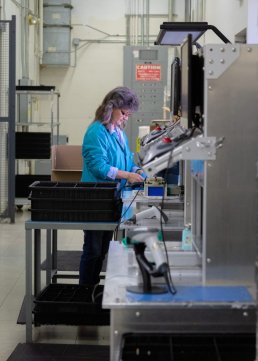
Meet Futaba’s Test Engineering Group
They design hardware and software to ensure a quality product before it reaches our customer.
Assuring Customer Satisfaction
Test Engineering is one of the major reasons for Futaba’s ongoing success in the electronic manufacturing service industry. Rock-solid testing solutions have made customers extremely happy with our quality. In the latest 6-month fiscal period, from April through October of 2019, Futaba’s monthly customer returns in parts per million (PPM) has been ZERO.
That is, we have had 0 customer returns since April, 2019.

Experience for Excellence
Futaba’s Test Engineers bring more than 50 person-years of experience in the field. Each Test Engineer boasts a minimum education of a Bachelor’s degree in Electrical Engineering, with proficiencies in ―
Electronics:
- Test hardware design
- DFT (Design for Test)
- Circuit analysis
- Failure analysis
Programming:
- C/C#/C++
- Basic/Visual Basic
- PHP/JavaScript/HTML
- SQL (MySQL, Oracle, and Microsoft)

Our Standard Functional Testers
We have 10 FCTs (functional testers) that are identically built. The testers were designed and built by our Test Engineers and Machinists.
If we build it, we can quickly fix it.
The benefit of having these testers designed and built in-house is that in the event of a tester problem, we have experts on hand that can quickly diagnose and repair it.
Spare testers at the ready
Since we have 10 identical testers, in the event that one goes down for a prolonged period of time (rarely happens), we have spares that can be swapped out and used to keep production running while our Test Technicians or Test Engineers repair a down tester.
Our Tester Design Philosophy
Our testers rarely go down because our Test Engineers use a “what would happen if…” philosophy in designing test equipment. For example, say a board to be tested had a short from power to ground. If the Test Engineer did not consider “what would happen if there was a short from power to ground” during the test design process, then chances are a fuse within the tester’s power supply would get blown. So, by considering this possibility, the Test Engineer designs the test hardware and software to detect problems with the board in such a way that test equipment is not damaged.
This thinking not only protects the test equipment, but it also protects the unit by allowing us to detect the short before applying power. There is a good possibility that applying power to a board with a short from the power line to ground will permanently damage the board, causing an increase in scrap. By detecting a short on the board before applying power, we give our Repair Technicians the chance to repair the board. This reduces our scrap rate.

Traceability
All of our function testers store test results into our manufacturing database that we call the “Tracking System”. Our Tracking System records detailed test data in real-time for every single unit that we have produced since 2006.
This data is accessible to our employees via our internal website. By having this data online, various departments can look for trends in the data and take appropriate action, where necessary.
This data is replicated in real-time to a server that is located offsite. This allows us to assure our customers that their test data will never get lost.
Lower manufacturing costs
Customers working with any electronic manufacturing service company should make sure their assemblies are tested with well-built testers. Functional testers that are well-designed help keep manufacturing costs to a minimum. Here are 4 ways:
1: Reduce Downtime
Expect the worst possible defect!
Testers should be designed with the mindset that it may encounter a “worst case” unit (such as a unit that has a solder short from power to ground).
Testers should not be damaged as a result of testing a unit that contains a particular kind of defect.
2: Reduce Scrap
Catch defects, not create them!
Poorly designed testers have mechanical devices – such as board hold-ups, hold-downs, and interface connectors – that are misplaced, or can easily become misplaced, causing physical damage to the board.
Futaba’s test fixtures go through an approval process before they can be used on the production floor. The fixtures are closely inspected for items that could physically damage a PCB assembly.
3: Increase Productivity
Spend time manufacturing, not fixing down testers!
Having production stop due to down test equipment will cause a reduction in productivity.
Similarly, reducing tester downtime will cause productivity to increase.
4: Less markup
Time is money! Scrap is money down the drain!
The less downtime your EMS company has, and the less their scrap rate is, the less they have to mark up your product to re-coup their manufacturing costs.
Customer Preferences
Our Test Engineering department works with our many customers in a variety of ways:
- Some customers have their own test equipment and require us to use to use it.
- Customer Supplies only test requirements or test specifications
- Customer would like testing but provides nothing
Let’s look at these 3 in more detail:
1. Customer Supplies everything for FCT
Approximately 10% of our electronic contract manufacturing customers supply everything (hardware and test software) we need to functionally test their boards.
For such customers, we request that they include some Futaba-supplied software that will allow their test software to integrate with “Tracking System”. We have never had a customer deny our request. Why? Because when their tester is linked into our production system via this database (instead of being an island unto itself) we can extract and save test information to our database. Our entire production process utilizes this “Tracking System”. It helps us ensure that the customer receives boards from us that passed all production processes. If a customer were to give us a functional tester and not work with Futaba on integrating it into our production database, there is a chance –though remote – that a customer could receive a board that either failed or skipped functional testing. Such customers don’t want that to happen. Therefore, they’ve been perfectly pleased to work with us on integrating their test equipment to our production database.
Our Test Engineers scrutinize any test equipment that we are provided by our customers to make sure that there are no test loopholes. If a loophole is found, we will work with them to have the tester modified so that we increase our test coverage.
2. Customer Supplies only test requirements/specification
At the time of this writing more than 75% of our customers fall in this category. These customers will give us a document that describes how we are to functionally test their module. The specification will tell us how much power to apply and to which pin(s), what are the acceptable current limits, what signals and what timing to apply to other pins and what should be the expected response.
Of the 3 testing scenarios, Futaba likes this one the best. You may be thinking, “Why would Futaba want to build a tester for our board instead of letting us build one for them?” The biggest reason is less potential downtime. As previously mentioned, Futaba has over 10 testers that are identical and full of various kinds of test equipment. The testers are generic enough that they can be used to test nearly everything we build. If our functional tester was to go down, we could simply remove the test fixture from it, plug it up to a different tester and keep producing. If a customer-supplied functional tester (comprising of both test equipment and test fixture) went down, we’d have no other tester to move production to and would have to get phone support from the customer, if our Test Technicians or Test Engineers could not locate the problem.
As with #1, our Test Engineers will scrutinize the customer-supplied test specification for potential loopholes. Our Test Engineers will work with the customer’s engineers to get any loopholes closed up in order to increase the test coverage.
3. Customer would like FCT but provides nothing
At the time of this writing, approximately 10% of our customers fall in this category. These customers are typically either startups or they are in a prototype/proof-of-concept stage. These customers have spent all their resources designing the product and would like to get it built and tested by us. They did not have the time to develop anything related to functional testing.
For such customers, our team of Test Engineers will study the schematic and talk to the customer to learn how the unit operates. From there we can develop a functional test.
High Quality at a Good Price
Let Futaba Build and Test Your Product!
Material costs and run rates are the 2 factors that pop into the heads of most people that think of what factors go into the costs of a PCB assembly from an EMS company. Very few think of electrical functional testers as an important factor.
Not only does a well-designed function tester give us complete assurance that we are delivering a quality product to our EMS customer, it also helps us give the best possible price by minimizing downtime and reducing product scrap.


